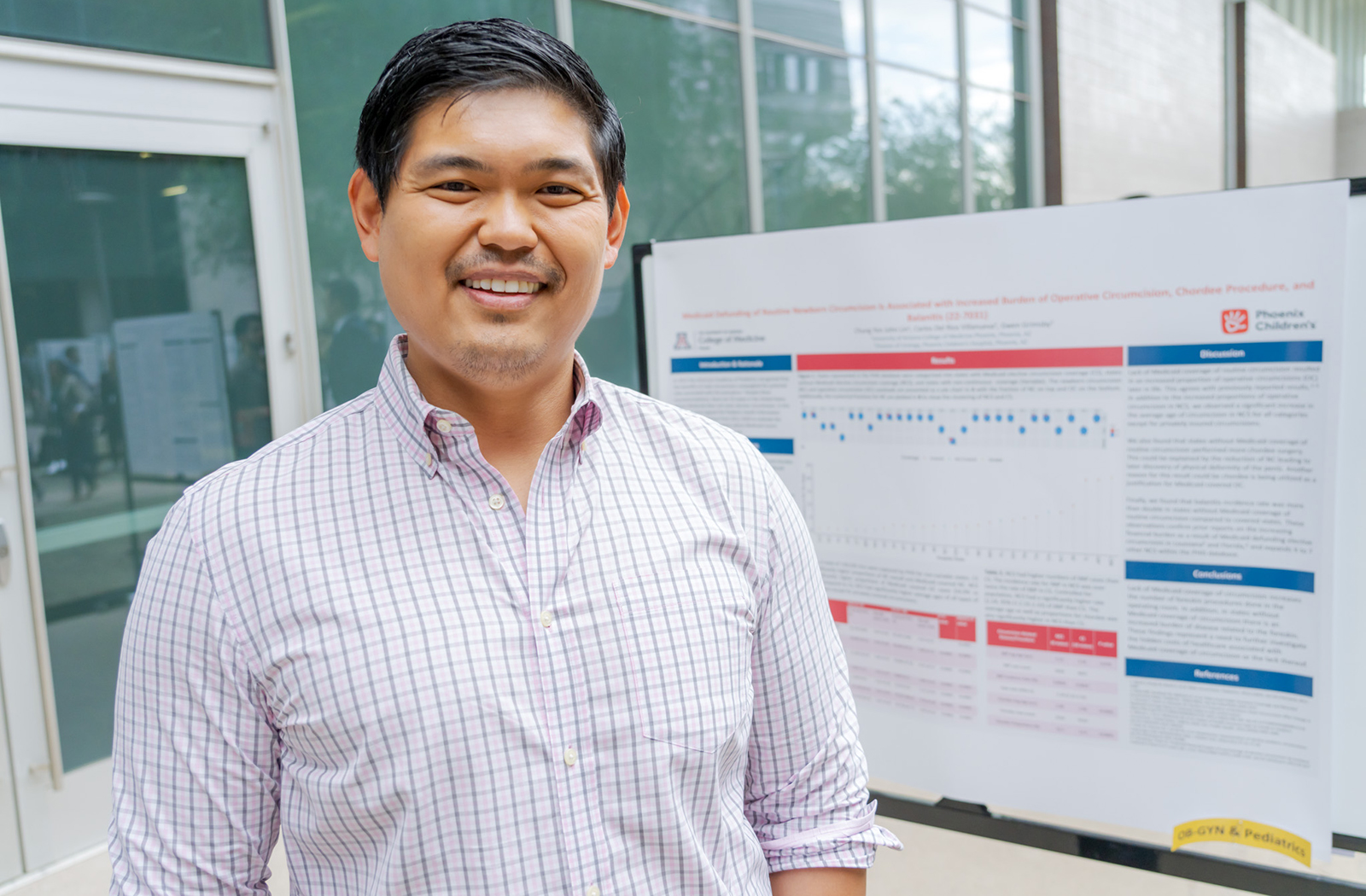
Scholarly Project Profile: Chung Yon John Lin, PhD

The Scholarly Project — a four-year, longitudinal research experience — is a key component of the college’s curriculum. Requiring medical students to complete a substantiative research project promotes greater medical information literacy, encourages life-long learning, and inspires students to practice evidence-based medicine and ethics. It also serves as a key differentiator during the residency interview process.
Meet Chung Yon John Lin, PhD
The journey of John Lin, PhD, to become a physician has taken him halfway around the world. Born in Japan, he grew up in Taiwan and came to the United States for his education.
Lin earned a PhD in chemistry at the University of Texas at Austin. His desire to translate research discovery into better patient care led him to enroll in medical school at the University of Arizona College of Medicine – Phoenix.
While his path to a career in medicine took a bit of a detour, he is exactly where he wants to be. Lin matched into urology at Mayo Arizona for residency where he hopes to continue doing research alongside his training.
About His Research
What did you think about completing a four-year research project as part of your medical education?
Tackling a four-year research project was a game-changer, especially for getting a foot in the door of a specialty like urology, where connections from our school might not be as strong.
My big piece of advice? Find yourself a stats wizard, either from the school’s research team or your own classmates, who can crunch numbers with you on the fly. And don’t be afraid to pivot.
What did you learn from the research process?
This deep dive into research really confirmed my love for urology. It was an eye-opener on how research, policy and clinical care intersect.
How did you choose this specific research focus and what was the aim of the project?
I investigated the effects of cutting Medicaid funding for newborn circumcision. Initially, I was on a different basic science project, but I switched gears to this one because it was more about real-world impact and was clinically relevant. Also, I wanted to get a closer look at urology and make a quick dash to publication.
And what was the outcome of the research?
We found that when Medicaid does not cover circumcision, more children end up needing surgery for foreskin issues down the line.
Plus, in places without Medicaid coverage, there’s just more foreskin-related health problems. It is a clear call to look more into how these policies are affecting health care costs and patient care.
Did your research influence your choice of specialty for residency?
Absolutely! It was not just about getting experience; it was also about the connections and mentorship I built that really sealed the deal for my residency choice.
How do you think this project helped to prepare you for your career in medicine?
Jumping into this project was like getting a front-row seat to see how policies really play out in the real world of medicine. At first glance, you might not think that Medicaid funding for something like newborn circumcision would have a big impact on day-to-day medical practices.
By diving into this research, it became super clear that these policy decisions touch everything — from the types of procedures we do more or less of, to the overall health challenges we see in different communities.
If there is one piece of advice you could give to incoming medical students about this project, what would it be?
If you don’t have a robust research background, find someone who has been through the research wringer. Having a partner or partners with solid research chops can make all the difference.
They can guide you through crafting sharp research questions, digging up the data you need, nailing the statistics and knowing when it’s time to cut your losses on a project that’s not panning out. It is about having that research savvy on your side to navigate the ups and downs.
About the College
Founded in 2007, the University of Arizona College of Medicine – Phoenix inspires and trains exemplary physicians, scientists and leaders to advance its core missions in education, research, clinical care and service to communities across Arizona. The college’s strength lies in our collaborations and partnerships with clinical affiliates, community organizations and industry sponsors. With our primary affiliate, Banner Health, we are recognized as the premier academic medical center in Phoenix. As an anchor institution of the Phoenix Bioscience Core, the college is home to signature research programs in neurosciences, cardiopulmonary diseases, immunology, informatics and metabolism. These focus areas uniquely position us to drive biomedical research and bolster economic development in the region.
As an urban institution with strong roots in rural and tribal health, the college has graduated more than 1,000 physicians and matriculates 130 students each year. Greater than 60% of matriculating students are from Arizona and many continue training at our GME sponsored residency programs, ultimately pursuing local academic and community-based opportunities. While our traditional four-year program continues to thrive, we will launch our recently approved accelerated three-year medical student curriculum with exclusive focus on primary care. This program is designed to further enhance workforce retention needs across Arizona.
The college has embarked on our strategic plan for 2025 to 2030. Learn more.